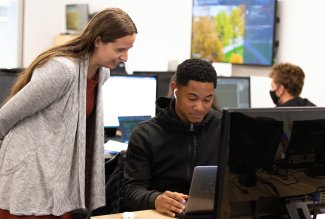
If you weren’t aware of the connection between rubber ducks and software development, then you haven’t met Ohio Northern University’s Stephany Coffman-Wolph, Ph.D.
An assistant professor of computer science, Coffman-Wolph is a master at developing the entrepreneurial mindset (EM) in her students. She models EM for her students with fun and engaging lessons, including a mid-term review that’s a scavenger hunt with rubber duck prizes.
“It’s my mission to craft a classroom environment that’s so enjoyable, students look forward to attending, even at eight in the morning,” she said.
Coffman-Wolph was recently named a 2023 KEEN Rising Star. The Kern Entrepreneurial Engineering Network (KEEN) is a partnership of more than 60 colleges and universities across the U.S. driving change within engineering education.
KEEN Rising Stars are “junior faculty who are driven by an entrepreneurial mindset to create long-lasting value directly impacting the hearts and minds of students, peers, and communities.” The recognition comes with a financial award, and KEEN only selects three rising stars each year.
Coffman-Wolph joins College of Engineering professors Health LeBlanc, Ph.D., associate professor of electrical and computer engineering and department chair, and Blake Hylton, Ph.D., associate professor of mechanical engineering and department chair, both past recipients of the honor. To date, ONU is the only institution to field more than one KEEN Rising Star.
ONU’s emphasis on high-impact teaching and learning is what drew Coffman-Wolph to the T.J. Smull College of Engineering, she explained.
“A big part of my approach is to ignite curiosity. I often assign open-ended projects, aiming to give my students the freedom to explore and discover on their own. This method dovetails beautifully with my experience at Ohio Northern. When they (the College of Engineering) described their teaching approach, I realized it was in perfect harmony with my own.”
Through interactive lessons, which she adapts for diverse viewpoints and ways of learning, Coffman-Wolph is teaching her computer science and engineering students to think critically and creatively. And most importantly, she’s sparking a love for the process of discovery.
She’s used a game of root beer pong to explain math concepts and “Cat in the Hat” to explain recursion. And, she and a colleague created an entire programming class around rewriting the 1980s video game, Oregon Trail, from a woman’s perspective.
One of favorite projects, however, is her mid-term review scavenger hunt.
There’s a concept in software engineering called “talk to the rubber duck,” she explained. When you hit a roadblock in coding, explaining your code and logic out loud can sometimes break the mental block. “And that rubber duck? It’s a non-judgmental listener,” she added.
She often encourages her students to “talk to the rubber duck” when they are stuck. So, it seemed natural that her scavenger hunt—in which students review concepts by solving codes that lead to the next clue—would end with rubber duck prizes.
“This rubber duck thing has been my jam for years,” she explained. “Hands-down one of my proudest projects. Students love it. Plus, it’s a cool way to chill out right before midterms—which can be super stressful, especially for first-years. It’s been a game changer.”
Read more about Coffman-Wolph’s teaching here.